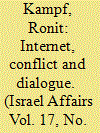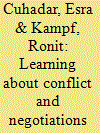| Srl | Item |
| 1 |
ID:
106307


|
|
|
|
|
| Publication |
2011.
|
| Summary/Abstract |
This article reviews studies evaluating Internet-based planned encounters between Israeli Jews and Palestinians and between Jews and Arabs in Israel. It goes on to explain the contradictory outcomes of these encounters concerning the potential of the Internet to serve as a learning ground for social and political understanding. Various aspects of these encounters, and the unique features of the medium in which they were conducted, are examined. These factors provide a framework for studying the potential of the Internet to promote positive inter-group contact.
|
|
|
|
|
|
|
|
|
|
|
|
|
|
|
|
| 2 |
ID:
136172


|
|
|
|
|
| Summary/Abstract |
This paper is based on a cross-national experimental study conducted among American, Turkish, Israeli-Jewish, and Israeli-Palestinian students using a computer game called “PeaceMaker.” The game is a highly realistic and complex simulation of the Israeli-Palestinian conflict. PeaceMaker was used for educational and experimental purposes in a classroom setting and each student played the game in both Israeli and Palestinian decision maker roles. Our purpose was to evaluate the game's effectiveness as a pedagogical tool in teaching about conflict and its resolution, especially with regard to generating knowledge acquisition, perspective taking as a crucial skill in conflict resolution, and attitude change. We were also interested in understanding whether these effects changed depending on whether the participants were direct parties to the conflict or not. In order to gauge the effect of the game in these areas, we used a pre- and post-intervention experimental design and utilized questionnaires. We found that the game increased the level of knowledge about the conflict for the Israeli-Jewish, Israeli-Palestinian, American, and Turkish students. We also found that the game successfully contributed to perspective taking among Turkish and American students only on a contemporary issue related to the conflict.
|
|
|
|
|
|
|
|
|
|
|
|
|
|
|
|